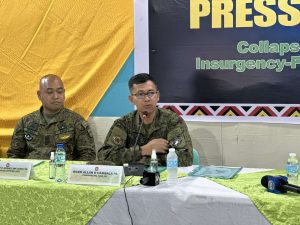Following the re-emergence of polio in the country, a waste and pollution watchdog group intensifies its campaign addressing to national and local authorities to intensify the government’s campaign on Zero Open Defecation (ZOD).
The EcoWaste Coalition said there is a great need to achieve ZOD after the Department of Health (DOH) recently confirmed two polio cases in the country, affecting a three-year old girl from Lanao del Sur and a five-year old boy from Laguna.
In the city, a water sampling from the Davao River also confirmed to contain the virus.
Polio, according to the World Health Organization (WHO) is “a crippling and potentially fatal infectious disease,” caused by the poliovirus, which is transmitted through the human feces, especially in places with poor hygiene and sanitation.
City Health Office (CHO) chief Dr. Josephine Villafuerte said the virus can be acquired through infected waterways and contaminated water bodies such as swimming pools.
“The unwelcomed return of polio in the Philippines, after almost two decades of being declared polio-free by WHO, should lead to an intensified implementation of the ZOD program and other preventive measures, including ecological solid waste management, toward improved environmental sanitation in our communities,” said Jovito Benosa, Zero Waste Campaigner, EcoWaste Coalition.
“Attaining the ZOD target will benefit sectors such as young children, pregnant women and those with impaired immune systems who are most vulnerable to polio and other infectious diseases,” he pointed out.
To stop open defecation, the EcoWaste Coalition is urging the legislators to ensure the allocation of sufficient funds for the construction of sanitary toilet facilities and the provision of hygiene and sanitation education, noting that only P2 million is allotted for building toilets in the proposed DOH budget of P160.15 billion for 2020.
Meanwhile, Benosa also encouraged the public to avail of the immunization through vaccines against the said disease.
“We can prevent polio from spreading through effective immunization and by ensuring people’s access to such basic necessities like water, sanitation and hygiene,” he added.
The oral polio vaccine (OPV) contains an attenuated (weakened) form of the virus, activating an immune response in the body. When a child is immunized with OPV, the weakened virus replicates in the intestine for a limited period, thereby developing immunity by building up antibodies.
Villafuerte said the anti-polio vaccine could prevent the disease that mainly affects children under 5 years of age.




